M
I
C
R
O
S
T
O
R
Y
O
F
A
R
T
........................................................

NOW COMPLETED:

........................................................
MICROSTORY OF ART
ONLINE JOURNAL FOR ART, CONNOISSEURSHIP
AND CULTURAL JOURNALISM
........................................................
INDEX | PINBOARD | MICROSTORIES |
FEATURES | SPECIAL EDITIONS |
HISTORY AND THEORY OF ATTRIBUTION |
ETHNOGRAPHY OF CONNOISSEURSHIP |
SEARCH
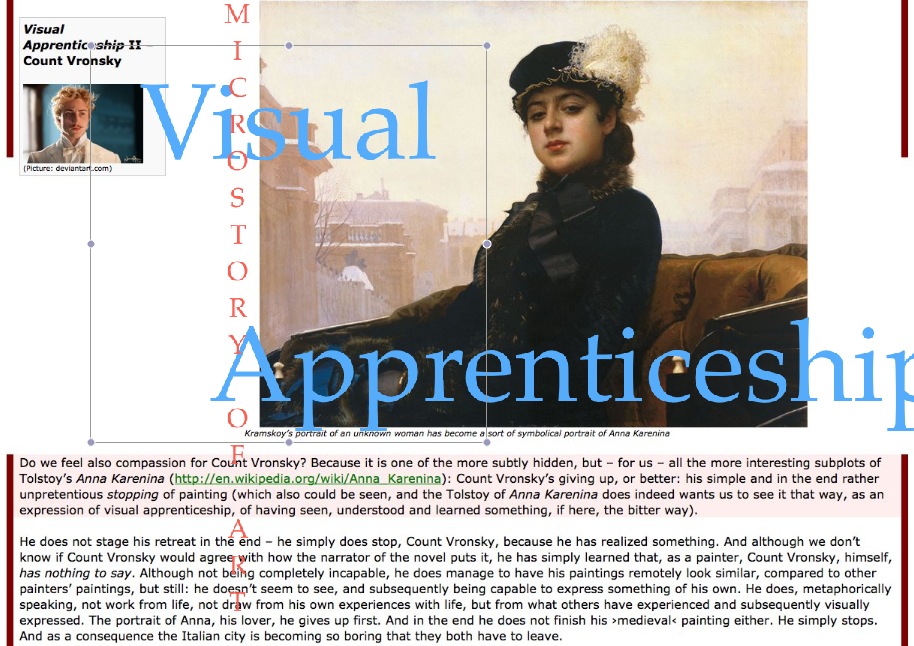
........................................................



 >MICROSTORIES
>MICROSTORIES
- Richard Serra
- Martin Scorsese
- Claude Simon
- Sunshine
- Werner Herzog
- The Creation
- Marcel Duchamp
- Nino Rota
- Wölfflin and Woolf
- Hansjörg Schneider
- Kraftort Arkadien
- Visual Biography
- Schlaraffenleben
- Die Geisteswissenschaften
- The Voyeur
- Buzzword Sustainability
- Paul Verlaine
- Tao Yuanming
- New Beginning
- Seneca
- Still Lifes
- Charles Baudelaire
- Frédéric Chopin
- The Art History of Sustainability
- Wang Wei
- Solarpunk
- Historians of Light
- Lepanto
- Renaturalization
- Plates
- Snow in Provence
- Learning to See
- Picasso Dictionaries
- Peach Blossom Spring
- Picasso Tourism
- Tipping Points
- Sviatoslav Richter
- Weather Reports
- Treasure Hunt
- Another Snowscape in Picasso
- Picasso in 2023
- Dragon Veins
- The Gloomy Day
- The Art of the Pentimento
- Reforestation
- The Status of Painting
- Emergency Supply
- Punctuality
- Watching Traffic
- Zhong Kui
- How Painting Survived the 1990s
- Confirmation Bias
- Sustainability and Luxury
- Garage Bands
- Picasso and Artificial Intelligence
- Eyes of Tomorrow
- Picasso in 2023 2
- Gluing Oneself to Something
- Suburbia
- Bamboo
- Sustainability and Carpe Diem 1
- Interviews with Bruegel
- Sustainability and Carpe Diem 2
- Coffee & Sugar
- Bamboo 2
- Picasso in 2023 3
- Sustainability and Carpe Diem 3
- Cherry Orchard
- Old Magazines
- Chance
- Nick Drake
- Harlequin
- The Smartphone & the Art Book
- Atlas Syndrome
- The Kitchen
- Atlas Syndrome 2
- Consideration
- Tori Amos
- School
- Orchard Auctioning Day
- The Hundred Years’ War
- Sócrates
- Chameleon
- Nefertiti Bust
- Picasso as a Computer
- Sunflowers
- Philemon & Baucis
- Ode to the Radio
- Childhood
- Wimmelbild
- Restitution
- Nick Drake 2
- Wishful Thinking
- Sundays
- The Independent Scholar
- September
- The Fisherman by Pirosmani
- Microadventure
- Sociology
- Salvator Mundi
- Chillon
- Appassionata
- Amber
- Homer
- Berlin
- Planet Walk
- Improvisation
- Seeing Picasso
- These Nice Kids
- Robber
- The One
- The Sea Turtle
- Zoo
- Through the Hush
- Wunderkammer
- I Do Not Seek, I Find
- Shopping Mall
- Food Hamper
- The Secretary
- This Gate
- Nor Rainy Day
- House on a Hill
- Beautiful Island
- Second-hand Bookstore
- Flat
- Slap in the Face
- Serra, Wenkenpark
- Apologies
- The Bells
- Nordmann Fir
- Picasso Wanting To Be Poor
- Picasso, Pirosmani
- A Brief History of Sculpture
- 24 Sunsets
- Rusty Phoenix
- Glove
- Wintry Stanza
- A Song
- Like A Beatle
- Catching An Orange
- Solar Bees
- Permaculture

 >FEATURES
>FEATURES
- Van Gogh On Connoisseurship
- Two Museum’s Men
- Ende Pintrix and the City in Flames
- Titian, Leonardo and the Blue Hour
- The Man with the Golden Helmet: a documentation
- Un Jury d’admission à l’expertise
- Learning to See in Hitler’s Munich
- Leonardo da Vinci and Switzerland
- The Blue Hour Continued
- The Blue Hour in Louis Malle
- Kafka in the Blue Hour
- Blue Matisse
- Blue Hours of Hamburg and LA
- A Brief History of the Cranberry
- The Other Liberale in the House
- The Blue Hour in Raphael
- Who Did Invent the Blue Hour?
- Monet on Sustainability
- Velázquez and Sustainability
- The Blue Hour in Guillaume Apollinaire
- Van Gogh on Sustainability
- The Blue Hour in Marcel Proust
- Picasso and Sustainability
- The Contemporary Blue Hour
- The Blue Hour in 1492
- The Blue Hour in Hopper and Rothko
- Hopper and Sustainability
- The Blue Hour in Ecotopia
- The Hour Blue in Joan Mitchell
- Explaining the Twilight
- The Twilight of Thaw
- The Blue Hour in Pierre Bonnard
- Explaining the Twilight 2
- Picasso on Stalin
- Rubens on Sustainability
- The Salvator Mundi in Bruegel and Rubens
- The Blue Hour in Leonardo da Vinci and Poussin
- The Blue Hour in Rimbaud
- Faking the Dawn
- Frost and Thaw in Ilya Ehrenburg
- Picasso, Stalin, Beria
- Picasso, Solzhenitsyn and the Gulag
- Shostakovich on Picasso
- Hélène Parmelin in 1956
- Historians of Picasso Blue
- Picasso Travelling to Moscow 1
- The Blue Hour in Caravaggio
- Picasso Travelling to Moscow 2
- Picasso, the Knife Game and the Unsettling in Art
- Some Notes on Leonardo da Vinci and Slavery
- Picasso Moving to the Swiss Goldcoast
- The Blue Hour in Camus
- The Blue Hour in Symbolism and Surrealism
- Caspar David Friedrich in His Element
- Exhibiting the Northern Light
- Caspar David Friedrich in His Element 2
- Robert Schumann and the History of the Nocturne
- The Blue Hour in Robert Schumann
- Caspar David Friedrich and Sustainability
- The Twilight of Thaw 2
- Multicultural Twilight
- The Blue Hour in Anton Chekhov
- The Blue Hour in Medieval Art
- Twilight Photography
- The Blue Hour in Bob Dylan
- Iconography of Optimism

 >SPECIAL EDITIONS
>SPECIAL EDITIONS
- Visions of Cosmopolis
- Mona Lisa Landscapes
- Turner and Ruskin at Rheinfelden
- Painters On TV & On TV
- Spazzacamini in Art
- A Last Glance at Le Jardin de Daubigny
- The Experimental Cicerone
- A Dictionary of Imaginary Art Historical Works
- Iconography of Blogging
- Begegnung auf dem Münsterplatz
- Cecom
- Das Projekt Visual Apprenticeship
- Those Who See More
- A Fox on Seeing with the Heart
- Sammlung Werner Weisbach
- Daubigny Revisited
- Some Salvator Mundi Microstories
- Some Salvator Mundi Afterthougths
- Some Salvator Mundi Variations
- Some Salvator Mundi Revisions
- A Salvator Mundi Questionnaire
- A Salvator Mundi Puzzle
- Unknown Melzi
- Francis I and the Crown of Charlemagne
- From Amboise to Fontainebleau
- Drones Above Chambord
- Looking Back At Conques
- Flaubert At Fontainebleau
- Images of Imperial Ideology
- The Chronicles of Santa Maria delle Grazie
- Seeing Right Through Someone
- Melzi the Secretary
- Eying Glass
- A Foil to the Mona Lisa
- A Renaissance of the Cartoon
- Sketching a Family Tree
- Venetian Variations
- A Brief History of Digital Restoring
- A Consortium of Painters
- Leonardeschi and Landscape
- A Christ in Profile
- Learning to See in Spanish Milan
- A History of Gestures
- Leonardo and Josquin
- A Renaissance of the Hybrid
- Suida and Heydenreich
- The Watershed
- Three Veils
- From Beginning to End
- Connoisseurship of AI
- Twilight and Enlightenment
- The Blue Hour in Chinese Painting
- Dusk and Dawn at La Californie
- Iconography of Sustainability
- The Blue Hour in Goethe and Stendhal
- The Sky in Verlaine
- The Blue Hour in Paul Klee
- Iconography of Sustainability 2
- The Blue Hour in Charles Baudelaire
- From Bruegel to Solarpunk
- Some Salvator Mundi Documentaries
- Some More Salvator Mundi Monkey Business
- The Windsor Sleeve
- Brigitte Bardot’s Encounter with Picasso
- Art Historians and Historians
- A Salvator Mundi Chronicle
- The Salvator Mundi and the French Revolution
- The Fontainebleau Group
- The Encounter of Harry Truman with Pablo Picasso
- The Fontainebleau Group Continued
- The Windsor Sleeve Continued
- The Salvator Mundi in Early Netherlandish Painting 1
- Some Salvator Mundi Resources
- A New Salvator Mundi Questionnaire
- The Woman in Picasso
- The Yarborough Group
- Melzi, Figino and the Mona Lisa
- The Yarborough Group Continued
- A Salvator Mundi Global History
- The Salvator Mundi in Medieval Art
- The Salvator Mundi in Medieval Art 2
- The Salvator Mundi in Early Netherlandish Painting 2


 >HISTORY AND THEORY OF ATTRIBUTION
>HISTORY AND THEORY OF ATTRIBUTION
- The Mysterious »Donna Laura Minghetti-Leonardo«
- Assorted Demons of Connoisseurship
- Panofsky Meets Morelli
- Discovering the Eye of Sherlock Holmes
- Handling the Left-handed Hatchings Argument
- Visual History of Connoisseurship
- Alexander Perrig
- Connoisseurship in 2666
- What Postmodernity Has Done to Connoisseurship
- Dividing Four Fab Hands
- A Leonardesque Ambassador
- Test Cases in Connoisseurship
- A Raphael Expertise
- How to Tell Titian from Giorgione
- Louise Richter
- The Unique Property in the History of Connoisseurship
- An Expertise by Berenson
- The Book of Expertises
- An Album of Expertises
- An Expertise by Friedländer
- A Salvator Mundi Provenance
- How to Tell Leonardo from Luini
- An Expertise by Crowe and Cavalcaselle
- An Expertise by Bayersdorfer
- An Expertise by Hermann Voss
- An Expertise by Hofstede de Groot
- Leonardeschi Gold Rush
- An Unknown »Vermeer«
- An Expertise by Roberto Longhi
- An Expertise by Federico Zeri
- A Salvator Mundi Geography
- A Salvator Mundi Atlas
- The Bias of Superficiality
- 32 Ways of Looking at a Puzzle
- James Cahill versus Zhang Daqian
- Five Fallacies in Attribution
- On Why Art History Cannot Be Outsourced to Art Dealers
- On Why Artificial Intelligence Has No Place in Connoisseurship
- Salvator Mundi Scholarship in 2016
- Leonardo da Vinci at the Courts
- The Story of the Lost Axe
- The Last Bruegel
- A Titian Questionnaire
- On Where and Why the Salvator Mundi Authentication Did Fail
- The Problem of Deattribution

 >ETHNOGRAPHY OF CONNOISSEURSHIP
>ETHNOGRAPHY OF CONNOISSEURSHIP
MICROSTORY OF ART
ONLINE JOURNAL FOR ART, CONNOISSEURSHIP
AND CULTURAL JOURNALISM
........................................................
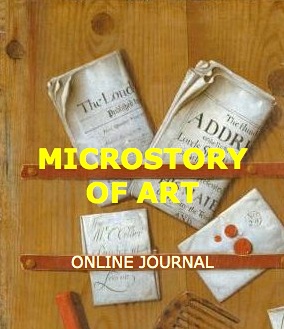
***
ARCHIVE AND FURTHER PROJECTS

1) PRINT


***
2) E-PRODUCTIONS


........................................................

........................................................

........................................................
FORTHCOMING:

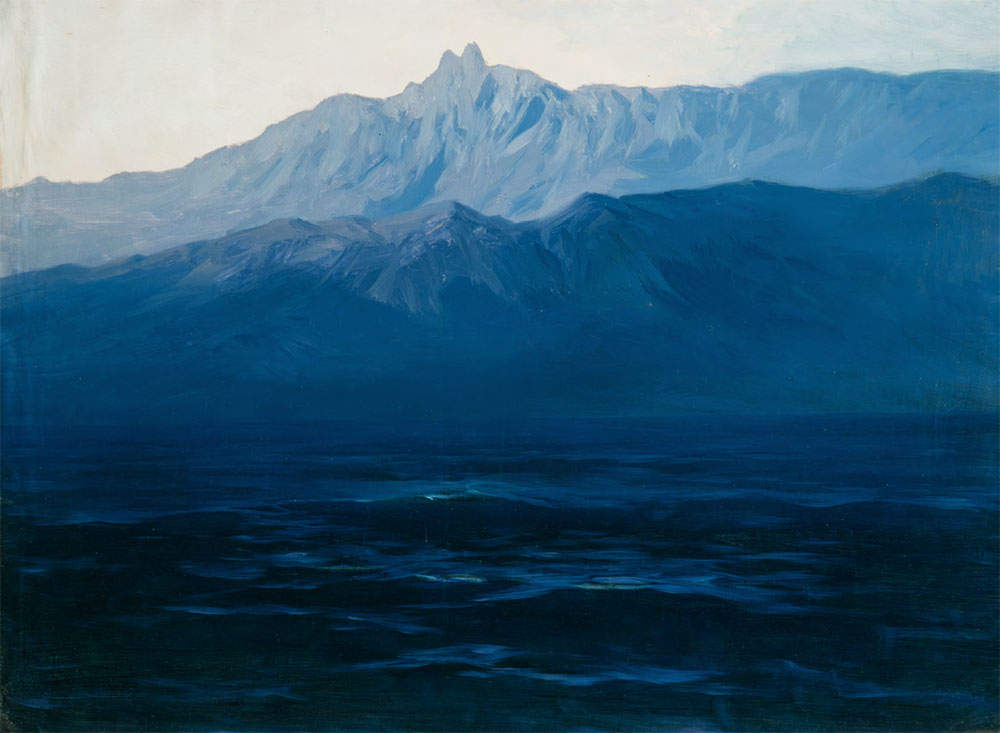
***
3) VARIA

........................................................

........................................................
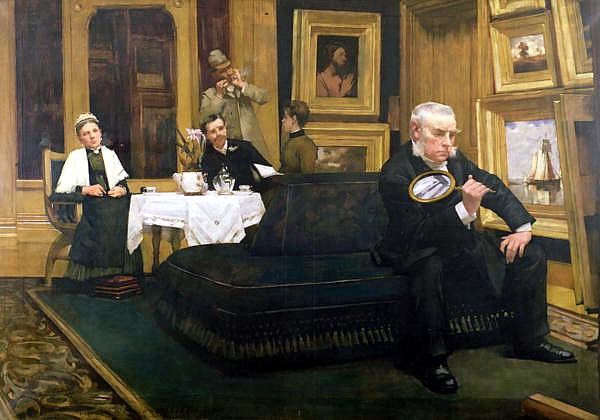
........................................................

........................................................

........................................................
***
THE GIOVANNI MORELLI MONOGRAPH

- The Giovanni Morelli Monograph
........................................................
MICROSTORY OF ART
ONLINE JOURNAL FOR ART, CONNOISSEURSHIP AND CULTURAL JOURNALISM
HOME
Ethnography of the Expertise
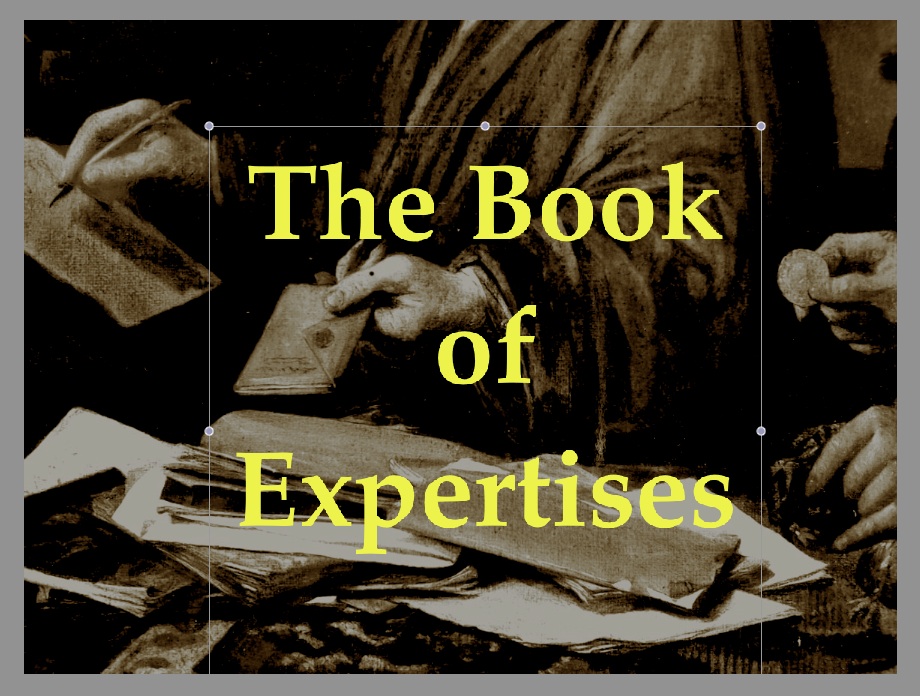
Ethnography of the Expertise
Interesting times for putting together an Ethnography of the Expertise. And I am referring to the current (November 2016) general dawn of media experts and journalists. A golden time, one might say, for observing dawn of experts (and how expert’s failure is explained/explained away). But I am looking at it more soberly: it’s always a good time to observe expert’s failures, as well as expert’s successes, and how both are explained (and explained away). Because expertises are ubiquitous.
We focus at the art expertise, and we also see it as a type (see below our ›typology of the art expertise‹). And we are looking at the subject more generally. Because this Ethnography is meant to be part of our Book of Expertises.
Expertises are part of any play of power, and this is why the subject is more generally relevant as it might seem at first. A history of power could be written as a ›literary history of the expertise‹. But not to forget: expertises do not always manifest in shape of texts. And there is more, as far as the invisibility of power is concerned. Institutional rules, according to which expertises are meant to be written or uttered, institutional rules that are challenged by more informal expertises. And there is also a more informal rule of the expertise: expertizing without explicitly agreed-to rules, one might say. All not generally visible or graspable.
In a word, it is about the field of power, and as far as the field of science and general knowledge is to be seen as a field of power as well. Our paradigm is and remains the art expertise. But here it is about more, about the art expertise as a paradigm. A paradigm of what? Let’s say: of the voice of power. Definatory power. Because in any written expertise it is becoming manifest power. And at the same time, in manifesting itself, power is becoming visible. To be scrutinized, in its presumptions (or pretensions). By other experts. Or by mere observers of power, being played out in the field of knowledge.
Art Expertise, Typology of:
upcoming
Confirmation Bias:
See: The Unique Property in the History of Connoisseurship
Curatorial Files (in museums):
This is where, very often, expertises, transcriptions of expertises and the like can be located.
Gestural Expertise:
upcoming
Goya:
See: D. Angulo Iñiguez, Una ›expertise‹ de Goya sobre un supuesto dibujo de Correggio, in: Archivo Español de Arte 14 (1946), pp. 169-172
Habilitationsgutachten, The:
upcoming
Historians and Expertises:
If we shift our focus from looking at art historical expertises to looking at expertises provided by historians in general, we realize that this is another extraordinarily important field. See the memoirs of the (notoriously prolific) Swiss historian Georg Kreis (Vermessene Zeiten. Meine Erinnerungen, p. 321): »Und anderes: Bücher schreiben war bloss Nebenbeschäftigung. Das umfassendste Oeuvre dürften die vielen, vielen Gutachten sein, die im Laufe der Zeit geschrieben worden und alle bei der laufenden Liquidation ohne nochmalige Konsultation im Schredder gelandet sind. Im Falle meines Lehrers [Herbert] Lüthy habe ich darauf hingewiesen, dass diese Textgattung ein substanzieller Fundus zum Denken eines grossen Geistes wäre. In meinem Fall widme ich hier dieser Produktion bloss ein paar Zeilen, um darauf hinzuweisen, dass dies ebenfalls gemacht werden musste.« Expertises, as every academic knows, are crucial as to academic careers, but in the context of his memoirs Kreis also recalls the writing of an expertise assessing the quality of a radio feature that had been dedicated to a sensitive historical issue (p. 156).
Knowledge/Illusion of Knowledge:
One reason more to study the history of expertises as a textual genre: because history, that is, retrospective knowledge, does, very often, reveal the pretensions of those who believe to know. See also: Power/Illusion of Power (and keep in mind that also history as a textual genre does know its pretensions).
Literary History of the Expertise:
Genre that seemingly does not exist (it does exist, but someone has to write it). We know of the experts, but generally we do not get to see their written expertises. It is symptomatic that we have essential readings on power of the experts, but no one, seemingly seems to be interested to scrutinize how exactly these experts exert power. Invisibly to the public, one does assume. By their mere opinions or judgments, one does hear. But this is a half-truth. Even in the field of art, our field, written expertises do exist, not everyone does usually get to see them, but while those who write on expert power seem usually to assume that the expert is a kind of black box (only he does know what exactly he recognizes in what), and this assumption, of course, supports, the power of the expert, it endorses him with power. It’s your own fault if you do not ask. Ask him (or her) to explain judgments and opinions. It is as simple as that (given that you don’t want to accept unquestioned expert’s power).
Essential readings concerning the experts of various fields: Gabriele Goettle, Experten, Frankfurt am Main 2004; Macht und Ohnmacht der Experten, Merkur 66 (Themenheft) (September/Oktober 2012). See also ›Historians and Expertises‹.
Noteworthy Expertises in History (I):
The painter Paul Delaroche, giving his expertise on the Daguerreotype. See: Steffen Siegel (Ed.), Neues Licht. Daguerre, Talbot und die Veröffentlichung der Fotografie im Jahr 1839, Paderborn 2014, p. 229.
Plot:
The history of connoisseurship does know a plot of forgers with the aim to produce fake expertises by the German connoisseur Wilhelm von Bode.
Power/Illusion of Power:
Can any expertise per se be seen as exuding expert’s power? This, very often, might be an illusion. Because often expertises rather can be seen as the expression of expert’s powerlessness. Because decisions are made simply on other premises than expertises (while, all the same, it is suggested that decisions are made on basis of knowledge, expressed in expertises).

(Picture: DS ; detail from painting by Dutch artist)
Tactical Expertise, The (Tactics of Expertising):
upcoming
MICROSTORY OF ART
ONLINE JOURNAL FOR ART, CONNOISSEURSHIP AND CULTURAL JOURNALISM
HOME
© DS
